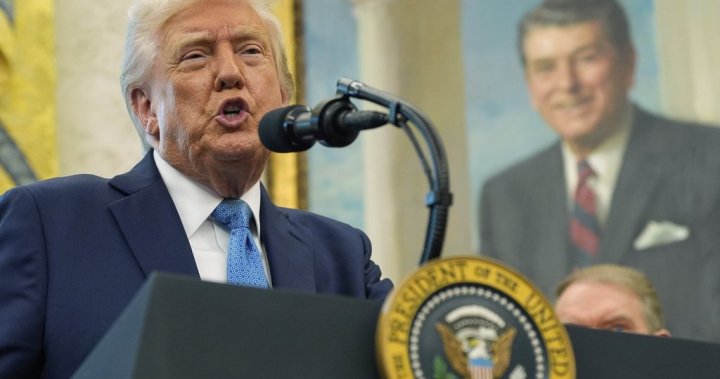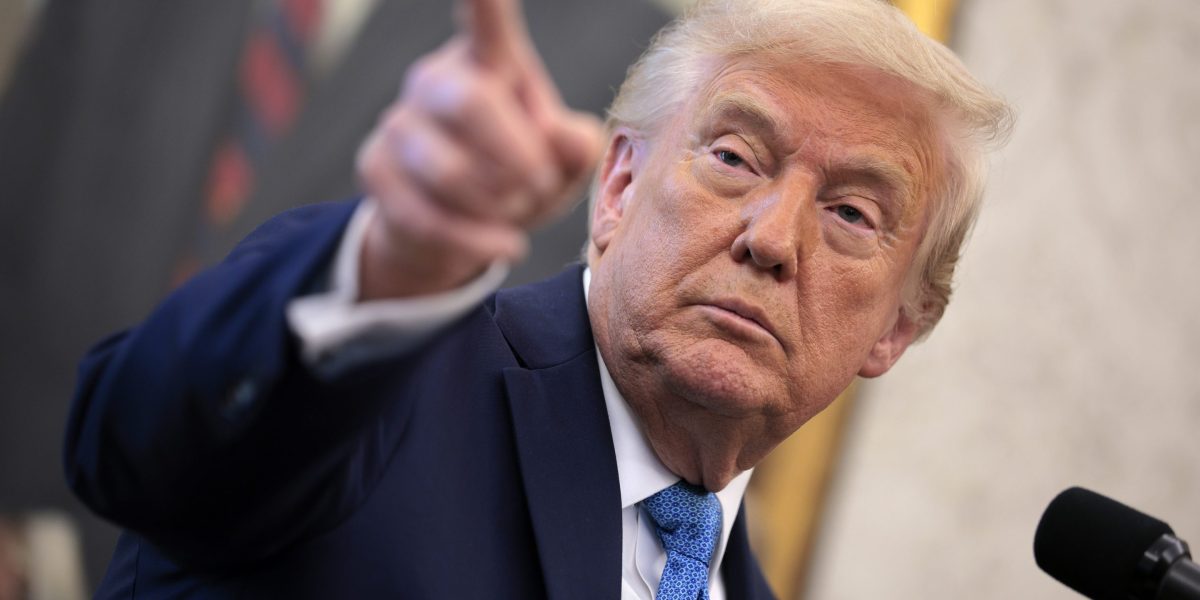North -American and World Economies will probably delay significantly following the rates of United States President Donald Trump, and the uncertainty they have created, said the International Monetary Fund on Tuesday.
The IMF said that the global economy will grow only 2.8 percent this year, from the January 3.3 percent forecast, according to its latest world economic perspectives. And by 2026, global growth will be 3.0 percent, the fund provides, also below its earlier estimate of 3.3 percent.
The fund also sees that the two largest economies in the world, China and the United States, weakening: the Economic Growth of the United States will reach 1.8 percent this year, abruptly lowering the previous forecast of 2.7 percent and a full percentage point below its expansion of 2024.
The IMF does not expect a recession from the United States, although it has increased its 25 percent probabilities to 40 percent this year. China is now expected to expand four percent this year and, next, will drop about half of its previous forecasts.
« We are entering a new age, » said Pierre-Olivier Gourinchas, an IMF’s chief economist. « This world economic system that has operated over the last 80 years is restored. »
The forecasts emphasize the widespread impact of both the rates and the uncertainty they have created. All countries in the world are affected, the IMF said, for imports in United States import taxes, which have now increased the average U.S. functions to 25 percent, the highest of a century.
The forecasts are largely in line with the expectations of private sector economists, although some fear that a recession is becoming more likely. JPMORGAN economists say that the possibility of a U.S. recession is now 60 percent. The United States Federal Reserve also provides for growth to weaken this year up to 1.7 percent.
The IMF is a 191 lending organization that works to promote economic growth and financial stability and reduce global poverty.
Pierre Poilievre said that on Tuesday a conservative government would use the revenue of the liberals implemented for aid for directly affected industries and to finance tax cuts.
The US will probably suffer a supply shock
Gourinchas said that the greatest uncertainty about import taxes led the IMF to make the unusual step of preparing several different scenarios for future growth. Its forecasts were completed on April 4, after the Trump Administration announced tariffs from almost 60 countries along with almost 10 percent universal tasks.
These functions were stopped on April 9 for 90 days. Gourinchas said that the pause did not substantially changed the IMF forecasts because the United States and China have imposed so strong rates since then.
The Trump administration has given the functions on cars, steel and aluminum, as well as 25 percent imports of imports to most assets in Canada and Mexico. The White House also imposed 10 percent of rates on almost all imports and a huge 145 percent of China’s goods, although smartphones and computers have been exempt. China has retaliated with 125 percent of duties in Usgoods.
The uncertainty that surrounds the upcoming movements of the Trump administration will also weigh greatly in the economies of the United States and World Cups, said the IMF. Most marketed products are parts that feed on finished products and rates could alter supply chains, similar to those that occurred during pandemic, warned Gourinchas in a blog post.
« Companies that have an uncertain market access will take a short term, reduce investment and reduce spending, » he wrote.

U.S. rates is also expected to reach less developed nations, with the economy of Mexico, which is now expected to reduce this year by 0.3 percent this year, out of a previous projection of 1.4 percent growth. South is expected to grow only 1.0 percent this year, below a 1.5 percent projection in January.
Although the north -American economy will suffer from an offer, Gourinchas said, China is expected to experience a small demand as U.S. purchases from its exports fall.
Inflation will probably worsen in the United States, up to about three percent at the end of this year, while IMF forecast will be changed little to China.
Rates to remove the piece of China’s economy
In his publication on the blog, Gourinchas acknowledged that there is an « acute perception that globalization unfairly displaced many domestic manufacturing tasks » and added that « there is some merit to these grievances. »
But he said that the « deepest force of this decline is technological progress and automation, not globalization. »
Gourinchas said that Germany, which has a commercial merchandise surplus, and the United States, which has a deficit, have seen that factory production is relatively relatively at the level in recent decades, even when automation has caused the occupation of manufacturing to decrease.
The IMF forecasts that the rates will take a large piece of China’s economy, but it also predicts that the additional spending of the Chinese government will compensate much of the success.

The European Union is expected to grow slower, but the success of the rates is not so great, partly because it faces the duties of the United States lower than China. In addition, part of the rates will be offset by the strongest expenditure of the government by Germany.
The economies of the 27 countries that use the euro are expected to be extended by 0.8 percent this year and 1.2 percent next year, up to 0.2 percent in the two years of the January forecast of the IMF.
Japan’s growth forecast has been reduced to 0.6 percent this year and next, 0.5 percent and 0.2 percent lower than January, respectively.
In a separate report on Tuesday, the IMF warned that « the world financial stability risks have increased significantly », along with the deterioration of economic perspectives. The fund said that some action and bond prices remained high despite the recent market route triggered by Trump’s rates, which means they are vulnerable to descents.
The IMF also warned that « some financial institutions could have a tension in volatile markets, » especially coverage funds and asset management companies and the risk that they will be forced to raise cash, selling investments in an already fragile market.















Leave a Reply